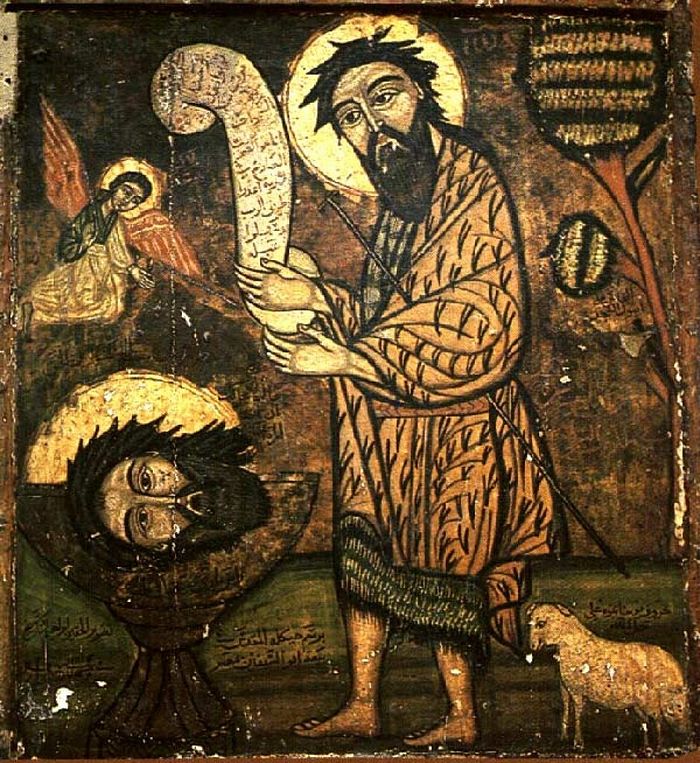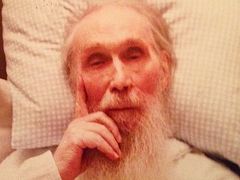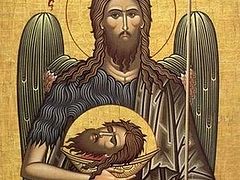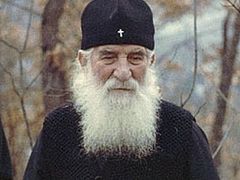In the name of the Father, the Son, and the Holy Spirit!
Dear brothers and sisters, today’s Gospel reading shows us a terrible picture telling the story of the death of the greatest prophet, called greater than all those born of women by the Savior Himself. Everything in this dark picture bears the imprint of something terrible and unspeakable. That wretched woman sitting at the head of the table, the dancing filled with total madness, and the clamorous applause of the feasters, and then suddenly … a head, steaming with warm blood, brought on a platter and presented by the executioner to a young girl who then gives it to her mother; that hellish comingling of hatred and crazed merry-making, dancing and murder, blood and lust—all of it makes the heart tremble and fills it with horror.
In reading the Holy Scripture, and especially the Lives of the great and righteous who pleased God on earth, one is involuntarily perplexed at one’s own self. Why? The majority of people, in fact almost everyone finds some peaceful, quiet existence on earth, receives various pleasures in life, some consolation in sorrows; but for God’s chosen, for the faithful and steadfast there is a life of such terrible and torturous persecution and often a terrifying death.
Just look at what deaths they die: The prophet Isaiah was sawn asunder at the orders of Manassas, Zacharias was murdered at the altar, Stephen was stoned to death, the apostle James’s head was chopped off, the apostle Peter was crucified, the apostle Paul was stricken with the sword—and those are but a few of the numberless hosts of those whose lives came to a martyric end. And only the Lord knows how many there were! But of all generations, the martyric death of St. John the Baptist was probably the most horrific.
Just imagine Herod’s court, glistening with firelight and highly animated, in which a feast is on and the merriment is escalating; but beneath them is a dank dungeon where silence reigns, from which there seems to be no exit into the light of day or freedom. In this dungeon languishes a man. In the middle of the night the heavy steps of a coarse and pitiless soldier are heard as they descend. The blunt noise of a heavily falling sword is heard, and it is finished. Was he found at sleep or was he praying? Could he have uttered a final word? We have only deathly sepulchral silence in reply…
Thus died the man whom Jesus Christ Himself called the greatest of all the prophets. And if we look at the picture of such a death, not having any other hope than this temporal, visible world, then we could exclaim, “O Vanity of vanities!” We could become disenchanted with life. But we are consoled by the bright hope that the righteous never die, that death is impossible for those who serve God with all the forces of their hearts and souls. They live forever. John the Forerunner even now speaks to us, and his voice is even now powerful in its rebuke of the lawless: It is not lawful for thee to have thy brother's wife (Mk. 6:18). With the Lord, no good work remains unrewarded. And if a reward is prepared for even the smallest, unseen, and modest self sacrifice, then what can we say about the martyrdom of St. John the Forerunner? His work was placed at the foundation of the Church, and the Church itself is indebted to such pillars as this greatest born of women.
Only through the self-sacrifice of God’s servants could the Church be born and grow. When we see some large building, we unfailingly suppose that it has a reliable foundation; after all, it couldn’t stand strong without a foundation. Although this foundation is unseen, without these hidden stones the building would fall into ruin at the first breath of wind or the first sign of a storm. And if the Christian Church exists now in the world, if there still is as before a refuge from earthly sorrows, a shelter in which the soul bursts out of its tight earthly chains, a spiritual fatherland, where people believe, hope, and love, then this is only because at the foundation of all of this lie the innumerable feats of self-denial, unknown deaths, unrecognized sufferings, and silent self-sacrifice, which no one can ever count. When a fortress is taken, hundreds fall into the surrounding moats, but the triumphant victor passes over their very corpses. And thanks to these heroic martyrs for the sacred and great idea of goodness and truth, for the faith of Christ, faith in truth’s future triumph becomes possible for us.
But we must not doubt, my dear ones, that this sorrowful event took place according to a special, mysterious divine decree and was allowed with an extraordinary, most lofty and beneficial aim. “The glorious beheading of the Forerunner was part of God’s dispensation, that he might proclaim to those in hades the coming of the Savior” (Kontakion of the Beheading, tone 5). The Savior of the world was awaited not only by those alive on earth, but also the dead, who greatly outnumbered the living. Someone had to preach to them of the coming of the Victor over death and hell. And for this great work of God’s Providence was chosen John the Forerunner, who first proclaimed the Savior’s appearance on earth.
Herod and Herodias, not knowing God’s ways, fulfilled the mysterious determination of God’s Providence, although their guilt was none the less for it, for they acted according to their insane will for the sake of their own passions. God’s ways are unsearchable. St. John already had many crowns for his ascetic labors, and now he receives a new crown—of martyrdom—and along with it a new task: to be the Forerunner and herald of the Savior in hades for all those who await His coming there. And therefore, as those present looked at the Prophet’s head lying on the platter, St. John was already standing in heavenly glory before the hosts of the righteous and proclaiming the coming of Christ the Savior, for Whom they had waited from the ages. But no one knew of this, and of course many tears were shed and perplexity and disappointment expressed: Is there Divine Providence after this and is it worth it to live righteously, when a pious life receives no reward at all, when Herod has had John beheaded in a dungeon?
For us, brothers and sisters, who behold the holy death of the righteous one, let his zeal for divine truth prevent us from the lawlessness of those whom he rebuked, and let our souls be inspired to speak the truth, to love truth, and to stand for God’s righteousness—perhaps even unto death itself. For this a great reward is prepared from the Lord in the future life: Blessed are they which are persecuted for righteousness' sake: for theirs is the kingdom of heaven (Matt. 5:10). Let us pray today to St. John the Baptist, that through his intercessions he might bless our earthly path, that we too might be vouchsafed by the Lord the most blessed and eternal life. Amen.




